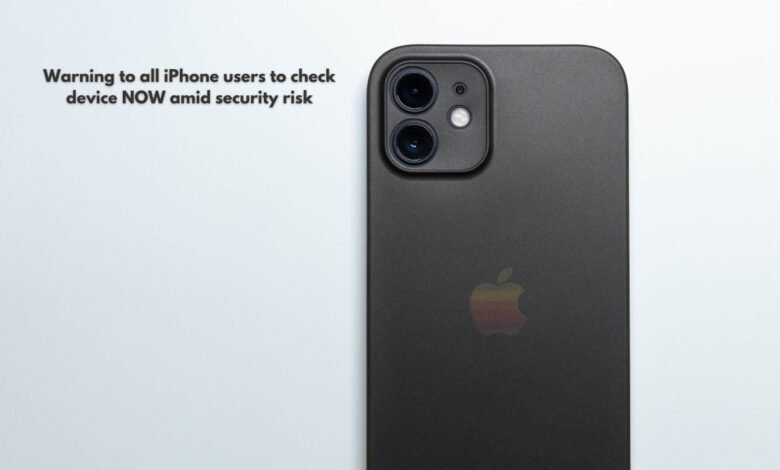Warning to all iPhone users to check device NOW amid security risk
Urgent warning to all iPhone users: Check your device now to address potential security risks.

Urgent warning for all iPhone users: Check your device now to address a amid security risk. Stay protected and secure.
In a significant development that has captured the attention of the global tech community, a new security alert has emerged, specifically targeting iPhone users. This latest advisory underscores the critical need for vigilance, as the potential threat carries serious implications for the privacy and security of millions of users worldwide. The urgency of this situation cannot be overstated, with cybersecurity experts urging immediate action to mitigate the risks involved.
Recent reports indicate that the security vulnerability in question could potentially allow unauthorized access to sensitive personal information stored on iPhones. This includes, but is not limited to, private messages, photos, financial information, and other confidential data. The exploit leverages a previously undiscovered flaw, which malicious actors could use to bypass existing security protocols, gaining control over the device without the user’s consent.
The ramifications of such a breach are profound. Beyond the immediate invasion of privacy, compromised devices could be used for further malicious activities such as identity theft, financial fraud, and the dissemination of malware. Given the extensive use of iPhones in both personal and professional contexts, the impact of this security threat is far-reaching, potentially affecting individuals and organizations alike.
This situation serves as a stark reminder of the ever-evolving landscape of cybersecurity threats. Despite the robust security measures implemented by Apple, this incident highlights that no system is impervious to exploitation. Therefore, it is imperative for all iPhone users to stay informed and take proactive steps to safeguard their devices.
As more details about the nature and scope of this security threat emerge, it is crucial to heed the warnings issued by cybersecurity experts and take the necessary precautions to protect your personal information. Remaining vigilant and staying updated on the latest security advisories will be key in navigating this critical period.
Understanding the Security Risk: What You Need to Know
Recent findings have uncovered a significant security vulnerability affecting iPhone users worldwide. This vulnerability was detected by a team of cybersecurity researchers who specialize in mobile device security. The flaw allows malicious entities to exploit certain weaknesses within the iOS operating system, leading to severe consequences for the affected users.
The primary risk stems from a combination of software bugs and inadequate encryption protocols, which cybercriminals can leverage to gain unauthorized access to your personal data. The potential impacts of this security risk include:
- Data breaches: Sensitive information such as photos, contacts, and messages can be exposed to unauthorized parties.
- Unauthorized access: Hackers can potentially gain control over your device, leading to a compromised system.
- Financial theft: Stored financial information, including banking apps and payment details, can be targeted and misused.
- Privacy invasion: Personal conversations and private files can be intercepted and exploited.
Understanding the nature of this risk is crucial for all iPhone users. The vulnerability allows attackers to bypass conventional security measures, making it easier for them to infiltrate devices without the user’s knowledge. This infiltration can occur through various methods, such as phishing attacks, malicious apps, or exploiting unpatched software flaws.
It’s important to note that while Apple has a robust security framework, no system is entirely invulnerable. Cybersecurity experts emphasize the importance of staying informed and proactive in safeguarding your device. Regular software updates, cautious app installations, and awareness of phishing schemes are vital steps in mitigating these risks.
By comprehending the potential threats posed by this security flaw, iPhone users can take necessary precautions to protect their data and maintain the integrity of their devices. Staying vigilant and informed is the first line of defense against emerging cyber threats.
Steps to Check If Your iPhone Is Affected
Ensuring your iPhone is secure is paramount, especially amid recent reports of potential security risks. Follow these steps to determine if your device is compromised:
Update Your Software
First, ensure your iPhone is running the latest version of iOS. Go to Settings > General > Software Update. If an update is available, tap Download and Install. Keeping your software up-to-date is critical as updates often include important security patches.
Verify Device Integrity
Check for any unusual activity or unfamiliar apps. Navigate to Settings > General > iPhone Storage. Review the list of installed apps and look out for any that you do not recognize or did not install yourself. Uninstall any suspicious apps immediately.
Monitor Battery Usage
Unusual battery drain can be a sign of a compromised device. Go to Settings > Battery and examine the battery usage by app. If an app you rarely use is consuming significant battery, it could be malicious. Consider removing or restricting that app’s background activity.
Check for Configuration Profiles
Malicious profiles can alter your iPhone’s settings. Head to Settings > General > VPN & Device Management. Here, you’ll see any installed profiles. Delete any profiles that you do not recognize or remember installing.
Review Your Network Connections
Compromised devices might connect to unknown Wi-Fi networks. Visit Settings > Wi-Fi and review the list of known networks. Remove any networks that you do not recognize.
Utilize Security Tools
There are several security tools available that can help identify potential threats. Consider using reputable apps like Lookout or Norton Mobile Security to scan your device for malware and other security issues.
By following these steps, you can help ensure your iPhone remains secure and free from potential threats.
Immediate Actions to Take If Your iPhone Is Compromised
If you suspect that your iPhone has been compromised, it is imperative to act swiftly to mitigate any potential security risks. Here are the immediate steps you should take to protect your device and personal information:
1. Change Your Passwords: Start by changing the passwords for your Apple ID and any other critical accounts, such as email, banking, and social media. Ensure that the new passwords are strong and unique. Avoid using the same password across multiple accounts.
2. Update Your Software: Make sure your iPhone is running the latest version of iOS. Software updates often include important security patches that can protect your device from vulnerabilities. To update your software, go to Settings > General > Software Update.
3. Enable Two-Factor Authentication: Two-factor authentication adds an extra layer of security to your accounts. Even if someone obtains your password, they will not be able to access your account without the second factor, usually a code sent to your device. Enable it for your Apple ID and other important services.
4. Review and Revoke App Permissions: Check which apps have access to sensitive information on your device. Go to Settings > Privacy to review app permissions and revoke access for any app that you do not recognize or trust.
5. Run a Security Scan: Use a trusted security app to scan your device for malware or other security threats. While iOS is generally secure, no system is entirely immune to threats.
6. Contact Apple Support: If you are still concerned about the security of your iPhone, contact Apple Support for professional assistance. They can guide you through additional steps and help you secure your device.
Taking these steps promptly can significantly reduce the risk of further compromise and protect your personal information from being misused. Remember, acting quickly is crucial in mitigating the impact of any security breach.
To safeguard your iPhone from potential security threats, it is crucial to implement a series of preventive measures. By taking these steps, you can significantly enhance the security of your device and protect your personal information.
Set Strong Passwords
One of the fundamental ways to protect your iPhone is by setting a strong, unique password. Avoid using easily guessable information such as birthdays or common words. Instead, create a complex alphanumeric password that includes a mix of uppercase and lowercase letters, numbers, and special characters. This makes it more difficult for unauthorized users to gain access to your device.
Enable Two-Factor Authentication
Two-factor authentication (2FA) adds an extra layer of security by requiring not only your password but also a second form of verification. This could be a code sent to your phone or an authentication app. Enabling 2FA ensures that even if your password is compromised, an additional verification step is needed, making unauthorized access much more challenging.
Regularly Update Software
Keeping your iPhone’s software up to date is vital for security. Apple frequently releases updates that patch vulnerabilities and fix bugs. Regularly updating your iPhone ensures that you have the latest security enhancements and are protected against newly discovered threats. Make it a habit to check for updates and install them promptly.
Be Cautious of Suspicious Links and Apps
Always be vigilant when clicking on links or downloading apps. Phishing attacks often use deceptive links to steal personal information, while malicious apps can compromise your device’s security. Only download apps from trusted sources like the Apple App Store, and scrutinize any links before clicking on them. If something seems suspicious, it’s best to err on the side of caution.
Preventive Measures Checklist
For easy reference, here is a checklist of preventive measures to protect your iPhone:
- Set a strong, unique password.
- Enable two-factor authentication (2FA).
- Regularly update your iPhone’s software.
- Avoid clicking on suspicious links.
- Download apps only from trusted sources.
By following these preventive measures, you can greatly reduce the risk of security threats and ensure that your iPhone remains secure.
- Best Tablets under 30,000 in India: Budget Friendly Options (2024)
- Move Over, Galaxy Ring: Fitbit Smart Ring Incoming?
- VPNs: Essential Tools for Privacy, Security, and Access
How Apple Is Addressing the Security Risk
In response to the recent security threat, Apple has taken swift and decisive action to safeguard its users. Recognizing the gravity of the situation, Apple has released an emergency software patch specifically designed to address the identified vulnerabilities. This patch is now available for all affected iPhone models, ensuring that users can quickly secure their devices against potential exploitation.
To apply these critical updates, users need to navigate to their iPhone’s Settings, select “General,” and then tap on “Software Update.” Here, they will find the latest security patch ready for installation. It is imperative for users to download and install this update as soon as possible to mitigate the risk posed by the security flaw.
Beyond the immediate release of the software patch, Apple has also implemented additional measures to enhance user safety. The company has increased its investment in security research, including expanding its bug bounty program to incentivize the discovery of vulnerabilities. These proactive steps underscore Apple’s commitment to maintaining robust security standards across its product ecosystem.
In an official statement, Apple emphasized the importance of user vigilance and staying up-to-date with software updates. “We take the security of our users very seriously,” an Apple spokesperson noted. “Our teams are working around the clock to ensure that our systems remain secure and that our users are protected. We strongly encourage all users to install the latest updates to safeguard their devices.”
Additionally, Apple has been transparent in its communication with users, offering detailed guidance on how to enhance device security. This includes enabling two-factor authentication, regularly updating passwords, and being cautious of phishing attempts. By following these best practices, users can further fortify their iPhones against potential threats.
Pros and Cons of Apple’s Security Measures
As Apple continues to fortify its devices against security threats, it is essential for iPhone users to comprehend the strengths and weaknesses of these measures. By evaluating the effectiveness and potential limitations, users can make informed decisions. Here, we outline the pros and cons of Apple’s security measures in response to the current threat.
Pros
1. Robust Encryption: Apple’s security measures are renowned for their strong encryption protocols, which help protect sensitive data from unauthorized access. This encryption is a significant deterrent against hackers and cybercriminals.
2. Regular Updates: Apple frequently releases security patches and updates, ensuring that devices remain protected against the latest threats. These updates are designed to address vulnerabilities and enhance the overall security framework.
3. User-Friendly Implementation: Apple’s security measures are generally easy to implement for users. Features such as Face ID, Touch ID, and two-factor authentication (2FA) provide seamless yet robust security options that do not compromise user experience.
Cons
1. Limited Customization: While Apple’s security measures are effective, they offer limited customization options. This can be a drawback for advanced users who require more granular control over their device’s security settings.
2. Potential Performance Impact: Some security updates and patches may lead to a temporary decrease in device performance. This can be particularly noticeable on older iPhone models that may struggle to handle the demands of new security features.
3. Dependence on Apple’s Ecosystem: Apple’s security measures are tightly integrated with its ecosystem. This means that users are heavily dependent on Apple’s continuous support and updates. Any delay in addressing security vulnerabilities could leave devices exposed to potential threats.
In summary, while Apple’s security measures provide robust protection and ease of use, they do come with certain limitations. By weighing these pros and cons, iPhone users can better understand the implications of these security measures and take proactive steps to safeguard their devices.
Conclusion: Stay Vigilant and Protect Your Device
As we have discussed, the recent security risks associated with iPhones highlight the necessity for heightened awareness and proactive measures. Ensuring that your device is updated with the latest software is paramount. Regularly checking for updates can protect against vulnerabilities that could be exploited by malicious actors. Utilizing strong, unique passwords and enabling two-factor authentication further fortifies your device’s defenses.
Beyond these measures, being cautious about app permissions and downloads plays a crucial role in maintaining security. Only downloading apps from trusted sources and scrutinizing the permissions they request can significantly mitigate risks. Additionally, being alert to phishing scams and suspicious links can prevent unauthorized access to sensitive information.
It is equally important to share this information with friends, family, and colleagues. Increasing awareness about potential security threats and the steps to counter them can help create a safer digital environment for everyone. As technology evolves, so too do the tactics of those seeking to exploit it; thus, staying informed and vigilant is an ongoing necessity.
Digital security is not just a personal responsibility but a collective one. By taking proactive steps and encouraging others to do the same, we contribute to a more secure digital landscape. Remember, maintaining the security of your iPhone and other devices is an investment in your digital well-being.
Let us all strive to stay vigilant, informed, and proactive in protecting our personal devices. The importance of digital security cannot be overstated, and together, we can make a significant difference.



